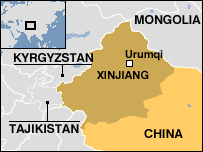China 'crushing Muslim Uighurs'


China 'crushing Muslim Uighurs'
The crackdown is done in the name of counter-terrorism, the report saysChina has been accused by two US-based human rights groups of conducting a "crushing campaign of religious repression" against Muslim Uighurs.
It is being done in the name of anti-separatism and counter-terrorism, says a joint report by Human Rights Watch and Human Rights in China.
It is said to be taking place in the western Xinjiang region, where more than half the population is Uighur.
China has denied that it suppresses Islam in Xinjiang.
It says it only wants to stop the forces of separatism, terrorism and religious extremism in the region, which Uighur separatists call East Turkestan.
Detentions and executions
The report accuses China of "opportunistically using the post-11 September environment to make the outrageous claim that individuals disseminating peaceful religious and cultural messages in Xinjiang are terrorists who have simply changed tactics".
CHINA'S UIGHURS
Ethnically Turkic Muslims, mainly in Xinjiang
Made bid for independent state in 1940s
Sporadic violence in Xinjiang since 1991
Uighurs worried about Chinese immigration and erosion of traditional culture
The authors of the report say it is based on previously undisclosed Communist Party and Chinese government documents, local regulations, press reports and local interviews.
The report says the systematic repression of religion in Xinjiang was continuing as "a matter of considered state policy".
Such repression ranges from vetting imams and closing mosques to executions and the detention of thousands of people every year, it claims.
"Religious regulation in Xinjiang is so pervasive that it creates a legal net that can catch just about anyone the authorities want to target," said Sharon Hom, Executive Director of Human Rights in China.
The report also reveals that almost half the detainees in Xinjiang's re-education camps are there for engaging in illegal religious activities.
Uighurs make up about eight million of the 19 million people in Xinjiang.
Many of them favour greater autonomy, and China views separatist sentiments as a threat to the state.
